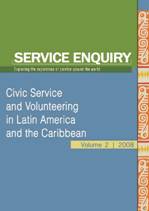New insights emerge on civic service and volunteering in Latin America and the Caribbean
 The role of civic service and volunteering in social change and development in the Latin American and Caribbean (LAC) region is the focus of Service Enquiry Volume 2, now available for downloading, free of charge, on www.service-enquiry.org.za.
The role of civic service and volunteering in social change and development in the Latin American and Caribbean (LAC) region is the focus of Service Enquiry Volume 2, now available for downloading, free of charge, on www.service-enquiry.org.za.
Available in both English and Spanish, the book explores civic service and volunteering in the LAC region. The volume is the second in a series of books that document the nature and extent of volunteering and civic service in different parts of the world. The Spanish edition was released in September 2007, and to date more than 4 000 copies of the book have been downloaded.
In 13 chapters, 24 authors draw together a range of perspectives on the role of volunteering and service in building democratic societies in the LAC region.
The book is structured in three parts: Part One provides an overview of volunteering and civic service in Latin America and the Caribbean and makes the case for volunteering as a tool for social development and democratisation. Part Two focuses on the extent to which volunteering and service find expression in the policy and legislative frameworks of various LAC countries. Part Three explores the emergence of youth service in the LAC region and examines the conditions under which voluntary service fosters youth development and youth participation in society.
Distinctive themes
In looking across the chapters, a number of distinctive themes emerge: volunteering and democracy, ‘new’ volunteering, policy and legislation, and the importance of partnerships.
Volunteering and democracy: A number of chapters highlight that volunteer action is an integral part of Latin American life, a force for change that needs to be recognised and valued. Contrary to the view that it is the preserve of privileged communities, Kliksberg indicates that volunteering in Latin American countries takes place among the poorest communities and that it is often a powerful expression of solidarity, driven by ethics and religious beliefs.
Volunteering is viewed as one means whereby the exclusion and poverty of young people, in particular, can be reduced. The authors suggest that community-based youth volunteering not only promotes youth participation and local development; it also enhances the economic competitiveness of countries in the region and strengthens environmental sustainability.
The significant role that civil society organisations have come to play in contributing to the spread of democracy in the region is also discussed. Many of these organisations are trusted entities that involve volunteers and are perceived to give expression to the concerns of communities on the ground.
‘New’ volunteering: Service Enquiry 2 explores how young people have become key actors in understanding new forms of volunteerism because their volunteering takes place in the context of their own exclusion and poverty. In conceptual terms this involves moving from the notion of ‘charitable volunteerism’, which involves a one-way, top-down, relationship between givers and receivers, to ‘communitarian volunteerism’, which is characterised by a horizontal relationship between those who give and those who receive.
‘New’ volunteerism transforms the person who volunteers as much as it transforms the recipient of the service, thus promoting mutual growth. By teaching people to value others and to see one’s own future as integrally related to the wellbeing of others, volunteering enables people to resolve differences and develop healthier relationships that are beneficial for communities and for countries as a whole.
Policy and legislation: The book also demonstrates how in the experience of LAC countries legislation can contribute to the growth of volunteerism, particularly organised volunteering. It is suggested that legislation in the different countries generally aims to foster solidarity among social actors, not to regulate volunteering. By creating legal frameworks that identify volunteering institutions and shape the material conditions under which they are able to receive technical and financial support, countries have strengthened organised volunteer agencies as part of civil society.
The importance of partnerships: This theme emerges strongly and a number of authors comment on the need for collaboration between civil society, the state, religious organisations and the private sector in order to build democratic societies. They note that the history of repression in LAC countries has made it necessary for these social actors to re-establish levels of trust and co-operation so as to contribute in a variety of ways to the democratic project, and they point to the potential of volunteering and service as mechanisms for bridging divisions and fostering social cohesion.
The authors also discuss how government partnerships with universities and private corporations have provided the impetus for taking volunteerism to scale, resulting in a more extensive range of service opportunities becoming available. However, they indicate that more research is needed to understand the impact of inter-organisational networks and programme partnerships on social capital and civic service.
Transatlantic collaboration
The development and production of this second edition of Service Enquiry represents a transatlantic collaboration between a number of partners committed to the promotion of service and volunteering worldwide: Centro Latinoamericano de Aprendizaje y Servicio Solidario, a non-governmental organisation based in Buenos Aires, Argentina; the Centre for Social Development, located at Washington University in St Louis, Miss, USA; Innovations in Civic Participation, located in Washington DC, USA; the Inter-American Development Bank, based in Washington DC, USA; and Volunteer and Service Enquiry Southern Africa, a non-governmental organisation based in Johannesburg, South Africa. The book was edited by Helene Perold and María Nieves Tapia with Alba González and Rosalía Montes as co-editors.
The book is available for downloading, free of charge, on www.service-enquiry.org.za.
- Rejoice Shumba and Helene Perold